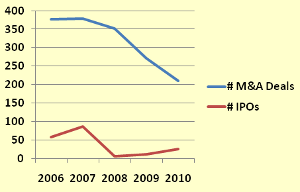I thought I’d commemorate my last week at Dell with tips for startup executives in integrating into an acquiring company. SilverBack Technologies was my third startup to be acquired. This list is the result of experiences of myself and former colleagues, generalized to apply to any large acquirer.
#1: Integrate Yourself Before Your Team
When a startup is acquired, its culture will irrevocably change. Sometimes the change occurs immediately; other times it occurs gradually. The key is not to try to control this assimilation, since its timetable will be driven by the integration strategy and business needs of the acquirer. The key is to ensure you integrate yourself before your team, allowing you to clear the path for others to follow.
#2: Don’t Get Lost In Process
Whether you are hiring a new employee, procuring hardware, or negotiating a third party contract, every large company has established processes to follow. The processes are the result of the global needs of your new organization, often evolved over time. The best of the processes will be more effective than the equivalent from your startup; the worst can be highly ineffective. I’ve watched many managers follow a process to the letter and complain when it failed to meet the needs of their team. The key is to make the new processes work for your team, optimizing, changing and/or driving exceptions to the process when required. Find and leverage institutional knowledge within the organization to understand the bounds of what you can and cannot do.
#3: Expand Your Network
Expand your network deliberately and proactively. It helps to identify the “connectors” in the new organization: people that have broad and deep networks acquired over years of service. The “connectors” can then help you identify and develop the required relationships to meet the current and future needs of your team. It is important to be proactive, since when a need arises, leveraging an existing relationship will always be faster than developing a new one.
#4: Adjust Your Messaging
You are more likely in a startup to think about what you want to say instead of how to say it. In most large companies however, the delivery of information is almost as important as its content. The scale and span of control of large organizations requires economization of information. To be effective in a large corporate environment, you must learn to adjust both your content and delivery to the target audience. I have found this to be one of the most overlooked skills for startup executives to hone.
#5: Maintain Team Focus
In the early days after acquisition, it can sometimes feel as though everyone in the acquiring company has a different need or opportunity for your group. The good news is the noise will eventually reduce to a manageable volume; the bad news is that this noise could have a substantial impact on the long term effectiveness of your team. Know who you are talking to, be willing to say no, and take on as few new commitments as possible until you have had the chance to fully integrate into the acquiring company. I’ll confess to having made more than my share of mistakes in this area.
#6: Keep the Team Together
Startup cultures invariably look and feel a lot like a family, forged by years of working and playing hard together. While you cannot stop or prevent a culture change, you can maintain one key aspect of every startup culture: a commitment to the team. One of the greatest successes of my last acquisition is that our team looked after each other, even when we no longer worked on the same projects. Our former CEO even maintained our staff meetings long after his former direct reports moved to other departments.
#7: Know When To Leave
Large companies optimize for very different organization needs, resulting in cultures and environments that are entirely different from a high tech startup. A former colleague told me once: “don’t stay so long that you think this is normal.” By this he meant: while your enterprise skills are advancing, your startup skills are atrophying. If you find a desire to pursue a long term career with a Fortune 500 company, you can ignore this tip. If not, recognize there is a limit to how long you can stay.
Conclusions
Startup acquisitions bring many great personal and professional opportunities for you and your team. But start your first day with a healthy recognition that you have challenges on the road ahead that will require hard work and focus to clear the path to success for you, your team, and your new found company.
Related Posts: 5 Rules To Maximizing Team Transparency, Build a Great Software Team
